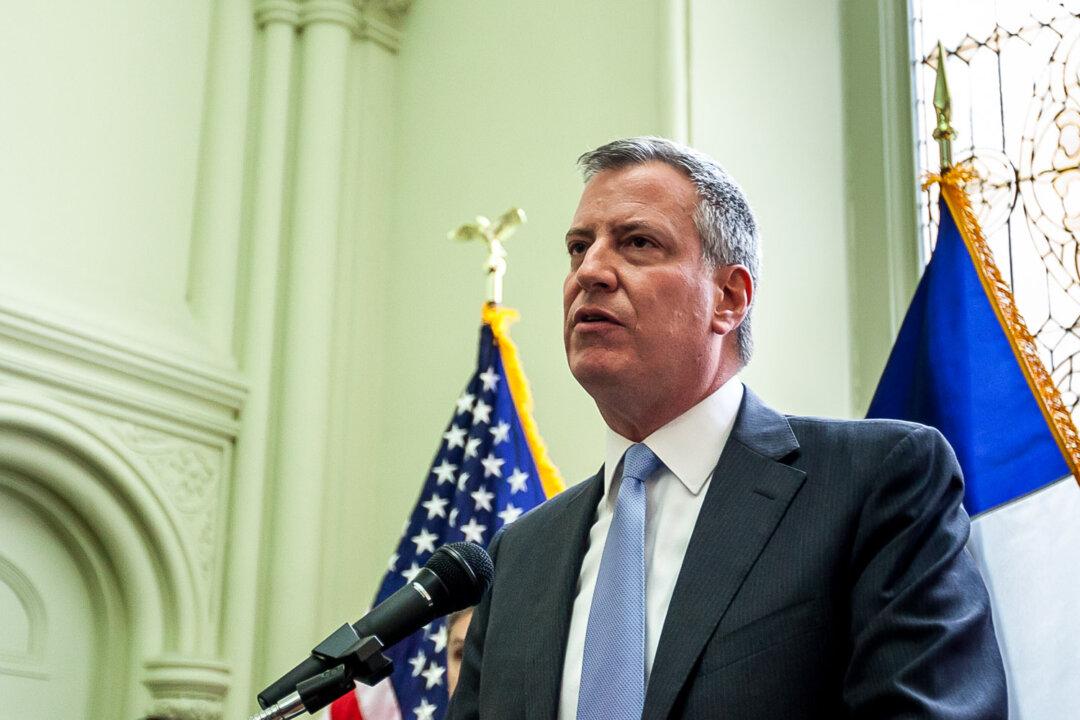NEW YORK—Mayor Michael Bloomberg may have handed mayor-elect Bill de Blasio a balanced budget, but the next administration still faces a fiscal challenge, with municipal labor costs accounting for much of the problem.
Pension and health care costs for municipal workers have increased dramatically over the past decade. Left unchecked, they will continue to rise, leaving less money for other services.
Money for small pay raises for municipal workers is in the budget for the first time in three years, but money for retro-pay—something the unions have said they will not do without—is not. If de Blasio gives in to the unions’ demands, he will have to find the money from another source in the budget.
“I want to emphasize this is going to be a very tough process to get us to an ultimately balanced budget going forward,” de Blasio said at a press conference on Nov. 27. “I think it will be tough, but I think ultimately not only do the people understand the kind of choices we have to make, I think a lot of the labor leaders do too.”
Labor Contracts
De Blasio’s first order of business will be to renegotiate at least some of the 152 expired municipal union contracts. De Blasio was staunch supporter of labor throughout his career. Bloomberg’s budget includes the money for only 1.25 percent raises and no retro-pay.
Labor unions have already balked at the idea, saying they deserve pay for the time they have been without a contract. Experts have said it would cost the city $7.8 billion to give everyone retro-pay and raises—something the city can ill afford.
De Blasio has said he will not negotiate in public, but promised to be fiscally responsible.
Health Care Costs
The labor negotiations will not only include raises and retro-pay, but also how much members will pay for their health care. In the budget he handed to de Blasio, Bloomberg stipulated union members would have to begin paying 10 percent on the premiums, something only a small fraction of members do now.
The unions have opposed the idea of increasing premiums.
The cost of health care for municipal workers has nearly doubled in the last decade and is projected to spike by nearly 40 percent in the next four years to roughly $7 billion by 2017.
Harry Nespoli, chairman of the Municipal Labor Committee, which represents roughly 100 municipal labor unions, said the unions would work with the next mayor on cost-saving measures.
“We are willing to call in the vendors again to lower their premiums so it does not cost the city that much money,” Nespoli said in an October interview.
Health care costs are an unfunded liability, meaning the city pays for it as the bills come in. If the unions continue to object to paying premiums, while only offering meek savings in return, de Blasio will be forced to pull funds from other areas of the budget to pay for the cost.
“The risk really becomes that the city won’t have money to pay for it and these folks who were promised these benefits when they were working for the city may not be able to receive them,” said Maria Doulis, director of city studies at Citizens Budget Commission (CBC), a nonpartisan watchdog group.
Ultimately the City Council will be the body that must pass the piece of legislation that changes how much union members pay on their premiums. The council would likely only pass a deal approved by the mayor and the unions.
Pension Costs
Pension costs for municipal workers will be less a part of de Blasio’s contract negotiations, but something he will need to keep an eye on.
Pension costs for the city’s municipal workers have skyrocketed during Mayor Bloomberg’s tenure. For the 2003 fiscal year, Bloomberg’s first budget, pension costs were $1.63 billion, according to budget reports from the City Comptroller’s Office. In fiscal year 2013 pension costs were $8.05 billion.
Like Bloomberg, de Blasio will have no control over pension costs, as changes must be approved in Albany, and would only affect new workers. Nevertheless, it is the city, not Albany picking up the tab when the pension fund—which invests heavily in Wall Street—does not meet its projections. After poor returns in 2012, the city was left with a $6 billion pension bill.
“When you have to use such a big share of your budget for pensions, you have less to devote to other priorities and services,” Doulis said. “The growth in pension costs is very vulnerable to the fund making its annual return and to any changes in pension benefits,” Doulis said.
In past years, Bloomberg had the advantage of surplus funds to cover the pension shortfalls. De Blasio will not have that advantage. The city is required by law to meet its yearly pension obligations, and putting it into debt is not an option. Any sudden crash in the markets would mean money earmarked for other services would need to be moved to pay for pensions.
The mayor-elect can’t do much to fix pension costs from City Hall. While at the negotiating table he can, however, ask labor leaders not to lobby state legislators for pension sweeteners. The sweeteners will only increase the city’s costs in the long-term, and could potentially take money away from other services.
As with how he will deal with union contracts, de Blasio was coy when asked about how he will deal with rising healthcare and pension costs.
“I am going to sit, when the time is right, I will sit with the various labor leaders and make clear we will need to find cost savings and ways to deal with this huge budget challenge,” de Blasio said on Nov. 27. “I am confident we will get there, but it will take a lot of work.”





